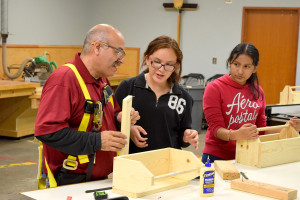 With fall classes underway at Oregon’s public universities, it’s a good time to remember the importance of preparing students to succeed in life after high school.
With fall classes underway at Oregon’s public universities, it’s a good time to remember the importance of preparing students to succeed in life after high school.
Whether students enroll in college or pursue a trade, rigorous academic preparation is the most effective means of increasing the odds they will achieve their goal, according to a classic report by The Bridgespan Group, a Boston-based education nonprofit.
A recent study by ACT provides empirical evidence that “whether planning to enter college or workforce training programs after graduation, high school students need to be educated to a comparable level of readiness in reading and mathematics.” The same level of academic preparation is necessary for college and entry-level jobs that require less than a bachelor’s degree, pay a wage sufficient to support a family, and offer the potential for career advancement.
High academic standards alone aren’t enough, though, for helping low-income students succeed and earn their degree, the researchers say.
“Expectations about college attendance are important with one in particular standing out: a student’s expectation that a college degree will be essential to pursue his or her desired career. Students who make this connection are six times more likely to earn their degree than those who did not.”
Just 60 percent of college freshmen complete a bachelor’s degree in six years, according to a new national study released in September. In Oregon, more than half of freshmen fail to complete their degree in four years, according to a recent article by Andrew Theen of The Oregonian/OregonLive.
In the 2015-17 budget cycle, Theen reports, Oregon lawmakers set aside $30 million for the state’s seven public universities to help keep students in school and on track to graduate.
As schools try to boost graduation rates, Bridget Burns of University Innovation Alliance says, it’s important to track how low-income students fare and whether colleges can narrow the gap between overall graduation rates and those for underrepresented minorities.
“We need to do a better job with the students we’ve done the worst with in the past,” Burns told Theen.
At Portland Workforce Alliance, we work with employers and educators to help students focus on their future.
We know that career-learning experiences such as career days, mentor/internships and apprenticeships motivate students to succeed academically and continue their education after high school. And we know that students are far more likely to stay in school if they see the relevance of their education and have relationships with caring adults.


